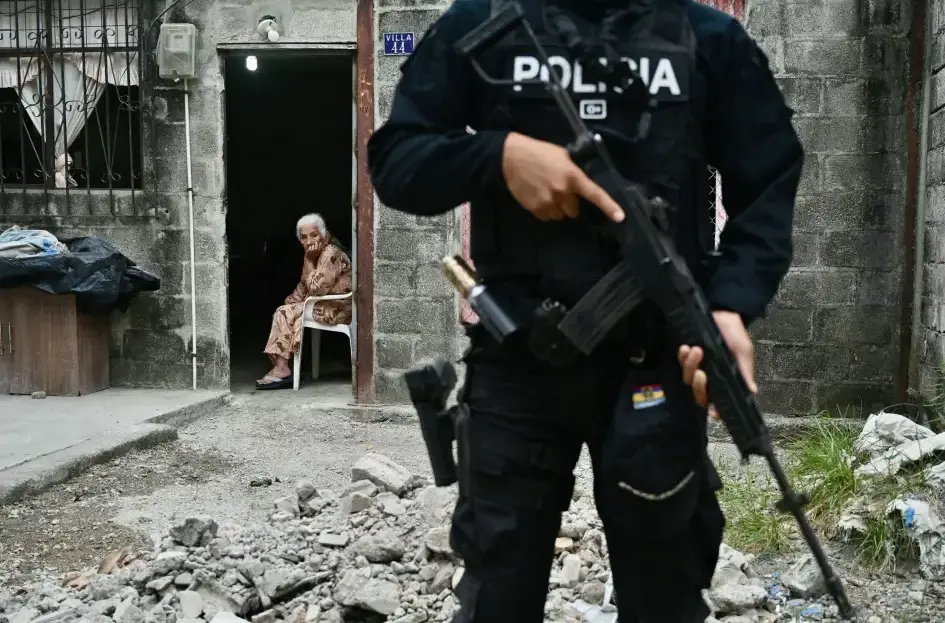Latin America and the Caribbean face a disturbing paradox: while countries seek to advance their development goals, organized crime is consolidating as a structural and persistent threat to collective well-being.
Criminal organizations have expanded their social and political influence, managing increasingly diversified illicit markets. Activities such as illegal mining, human trafficking, and extortion have allowed them to extend their control over institutions, territories, and entire communities.
The impact on the region’s human development is profound. Where the State fails to consolidate, criminal networks fill the void by offering an alternative—and often violent—form of governance. As warned in the UNDP’s Regional Human Development Report 2025, Under Pressure: Recalibrating the Future of Development, this form of control not only reproduces inequalities but also undermines the very foundations of social cohesion and democracy.
Criminal governance and trapped communities
Organized crime is not a hidden actor operating on the margins, but a power interwoven with social, economic, and political structures. In the peripheral neighborhoods of Rio de Janeiro or in rural areas of Colombia, criminal groups provide security, enforce “justice,” distribute food, or finance community projects and political campaigns. In many cases, this would not be possible without the complicity of local authorities or the desperation of citizens neglected by the State.
This “criminal governance,” as some researchers call it, does not seek to replace the State but to coexist with it, negotiating favors and establishing zones of influence. It is a hybrid model combining violence, corruption, and services, with devastating effects on human development. When people must pay for protection, obey rules imposed by armed gangs, or live under constant threats, the very idea of rights is suspended.
An extreme example is Haiti, where nearly 80% of the capital, Port-au-Prince, is controlled by gangs that replace the State in basic functions. These structures not only extort the population but also use sexual violence as a weapon of war and displace hundreds of thousands of people. In less acute contexts, the city of Rosario has become the epicenter of violence in Argentina, with a homicide rate that in 2022 reached a historic record of 25 murders per 100,000 inhabitants. The growth of micro-trafficking has fragmented criminal leaderships and led to chaotic violence affecting the poorest communities.
Obstacles to development: violence, informality, and exclusion
Organized crime does not operate in a vacuum. It feeds on environments marked by poverty, labor informality, institutional corruption, and social exclusion. In these contexts, formal and legal opportunities are scarce, and illegal markets appear as the real and attainable path to generating income.
In countries such as Peru or Brazil, illegal mining not only destroys ecosystems and displaces indigenous communities, but also captures resources that could be invested in health, education, or infrastructure. In the case of human trafficking, criminals find in forced migration a profitable business based on the sexual and labor exploitation of women, girls, and boys. And in Central American cities, small businesses, schools, and even hospitals must pay “rent” to operate without reprisals.
Furthermore, countries long considered models of stability and security in the region, such as Uruguay, Chile, or Costa Rica, are no longer exempt from the impacts of organized crime. In these societies, rising homicide rates, the penetration of drug trafficking, and the consolidation of illegal markets are eroding that perception of exceptionality. The fragmentation of gangs, the increase in urban violence, and the pressure on prison systems show that the threat is no longer limited to countries traditionally associated with high levels of crime.
Organized crime thus undermines the right to a dignified life, to education, to health, and to freedom—and the circle is completed with impunity. If judicial and police operators are co-opted or intimidated, if institutions fail to protect victims or punish perpetrators, crime perpetuates itself. And with it, distrust in democracy deepens.
What to do in the face of such a complex enemy?
Combating organized crime in Latin America requires much more than police operations or harsher laws. It demands a profound transformation of perspectives and public policies. This phenomenon is not limited to drug trafficking: it is a criminal ecosystem operating in multiple illicit markets, infiltrating institutions, capturing territories, and, above all, eroding the basic conditions for human development. That is why responses must match its complexity.
First, it is urgent to abandon linear solutions and adopt an integral approach. For decades, governments in the region have concentrated efforts and budgets on the fight against drugs, leaving other equally destructive illegal economies in the shadows: human trafficking, illegal mining, smuggling, or arms trafficking. These activities not only generate huge profits for criminal organizations but also devastate communities, destroy ecosystems, and strengthen corruption networks. Broadening the focus and acting in a coordinated way on these fronts is an essential first step.
But it is not enough to identify crimes: their territorial logic must be understood. The dynamics of crime are not the same in northern Colombia as in a Brazilian favela or a peripheral neighborhood in Rosario. In some cases, there are hierarchical structures exercising total control; in others, fragmented networks disputing territory street by street. That is why response strategies must be built locally, with precise diagnoses and differentiated policies according to territorial conditions.
It is also essential to restore the State’s presence where it has been displaced. And this does not mean only strengthening the police. It means providing public services, building schools, guaranteeing access to health, justice, and real opportunities. Where crime organizes daily life, the State must reappear as a legitimate, effective, and close alternative. Without reliable justice, decent jobs, and a gender-sensitive approach, any strategy will be incomplete.
Finally, no country can face alone a problem that transcends its borders. Criminal networks are transnational, and the response must be as well. Sharing information, coordinating regional strategies, harmonizing laws, and strengthening judicial cooperation are indispensable steps to sever the ties that connect these criminal networks across the continent.
A collective and urgent challenge
Organized crime is not only a security problem: it is a problem of development and governance. It affects the economy, erodes democracy, and condemns millions to live in fear or dependency. Confronting it requires political will, institutional capacity, and a regional perspective that recognizes the multiple faces of the phenomenon.
The strategy of capturing criminal leaders and seizing shipments is not enough. The real fight is about reclaiming territories, strengthening the social fabric, and restoring citizens’ hope that another model of life is possible—one where rights do not depend on a pact with crime, but on the real commitment of the State and society to human development.
This article is based on the UNDP’s Regional Human Development Report 2025, Under Pressure: Recalibrating the Future of Development in Latin America and the Caribbean.
*Machine translation, proofread by Ricardo Aceves.















